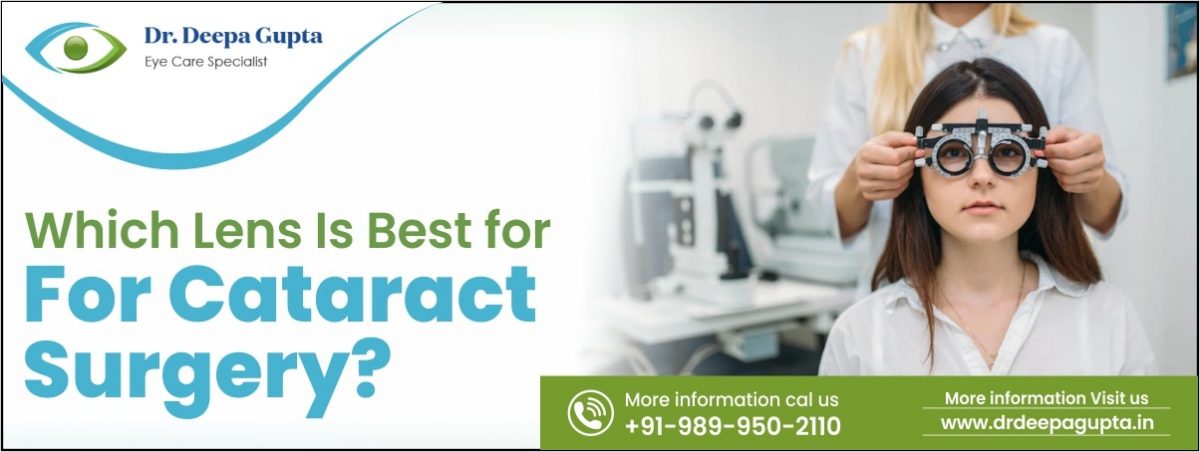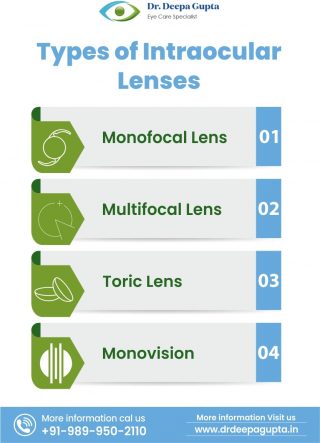Which Lens Is Best For Cataract Surgery?

Your Ultimate Intraocular Lens Guide
Cataract surgery is a vision correction procedure. However, it does not give you a perfect vision in many cases. To achieve that, patients had to wear glasses or contact lenses after the treatment. But due to the advancements in the ophthalmic field, you can now avoid that extra fuss.
The procedure of cataract surgery now includes implanting a new vision correction lens into each of your eyes. Lenses of different types and effects are available in the market from which you can choose. The availability of multiple options allows you to resolve your vision issues along with cataracts.
We understand that too many options might also mean the stress of determining the best type for you. This is why we have brought together a guide for you to understand why these lenses are needed, what types of lenses are available, and how to choose the right type for yourself.
Why Do You Need Lens After Cataract Surgery?
A cataract is caused by the clumping together and accumulation of the proteins in your eye lens. This causes your vision to turn foggy and blurred. Many people also experience a halo effect and light sensitivity. The doctor removes these clumped-up proteins during the surgery, which naturally improves your vision.
However, cataract is often observed in people around or above 40 years of age. During this time, a large part of the population also already suffers from vision defects like myopia, hypermetropia, or both.
So even if you get cataract surgery, you might not get normal clear vision. To deal with this, a lens implant is coupled with a cataract surgical procedure.
This way, your cataract and vision defect will be addressed with a single surgery.
What Is An Intraocular Lens?
A lens is a flexible, clear, and curved structure lying right behind your iris, the brown part of the eyes. It works to focus the light rays to form a clear image.
An intraocular lens can be considered an artificial version of your natural lens. It has a similar structure and performs the same function. These lenses can be customized to address your defects accurately.
There are mainly two types of visual defects. The first is spherical, which is caused due to abnormalities or defects in your natural lens. The other is cylindrical, caused due to dissymmetry of the optical curvature.
Different lenses are designed for each of these and other common issues. At Dr. Deepa Gupta’s Clinic, the doctor implants this lens during cataract surgery. The use of these lenses gives permanent results.
What Are The Different Types Of Intraocular Lens?
The different types of intraocular lenses have distinct features to focus on different visual defects. Hence, there is a high chance that you will find the one type that addresses your concerns.
- Monofocal Lens
As the name suggests, a monofocal lens allows your eyes to focus on a single distance range. You can choose whether you want to see the nearby objects or distant objects without the help of prescription glasses or contact lenses. This lens deals with spherical vision defects.
If you have either myopia or hypermetropia, the choice would be easy. However, while deciding, consider the fact that the lens would have a permanent effect.
Usually, the doctor advises getting the lens with distance vision as that is used the most. However, if you are an artist or read very often, you might prefer getting a near-sighted lens.
- Multifocal Lens
If having to choose between near and distant vision does not sound appealing to you, a multifocal lens might catch your attention. It also addresses spherical vision defects. However, this lens can allow you to focus on near and distant objects.
The power of the lens can be customized as needed. This could help you completely get rid of prescription glasses and contact lenses.
Note that this lens has some downsides, including glare and decreased contrast sensitivity.
- Toric Lens
A toric lens deals with spherical as well as cylindrical defects. As the only lens that corrects cylindrical defects, it is best for people with astigmatism because the condition is caused by a deviation from the normal spherical curvature of the eyes.
The Toric lens works on moderate to high levels of astigmatism. However, it also has specific vision ranges.
- Monovision
If none of the above lenses seem to work for you, this creative way definitely would! In monovision, the two eyes are implanted with two different lenses. Suppose the doctor implants one eye with a monofocal lens with near vision and the other eye with a monofocal lens with distant vision. This would allow you to see clearly in both visual ranges.
Which Lens Is Best For You?
The best lens for you depends on the type of visual defect you have. For instance, a toric lens is the best option for people with astigmatism. Monovision could be a smart way to address the issue if you have both myopia and hypermetropia.
Also, note that you might need to consider your budget while choosing. The type of lens you go for might affect the final cost of cataract surgery.
It is best to talk to your doctor about the matter. At Dr. Deepa Gupta’s Clinic, you can book an appointment with expert doctors. They would consider your vision status and suggest you the best options. You will also know if using a particular lens could have any side effects.
As the results are permanent, thorough consultation and consideration are necessary.
Bottom Line
At Dr. Deepa Gupta’s Clinic, we provide the best quality eye treatment. Our doctors are expert professionals with years of experience in ophthalmic treatment. You will find the solutions to all your eye-related issues here. Cataract surgery, cornea services, keratoconus treatment, and Lasik surgery are some of our best-known services.
The clinic is furnished with modern cutting-edge equipment to ensure brilliance and accuracy during the treatment.
Visit Dr. Deepa Gupta’s Clinic or book an appointment to get cataract surgery and lens implantation!

